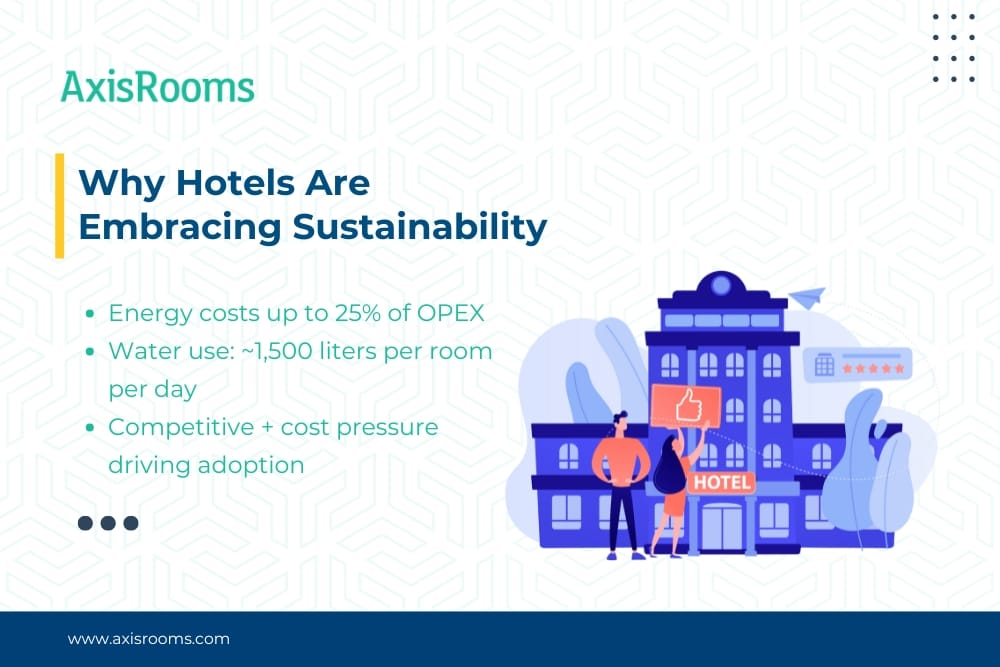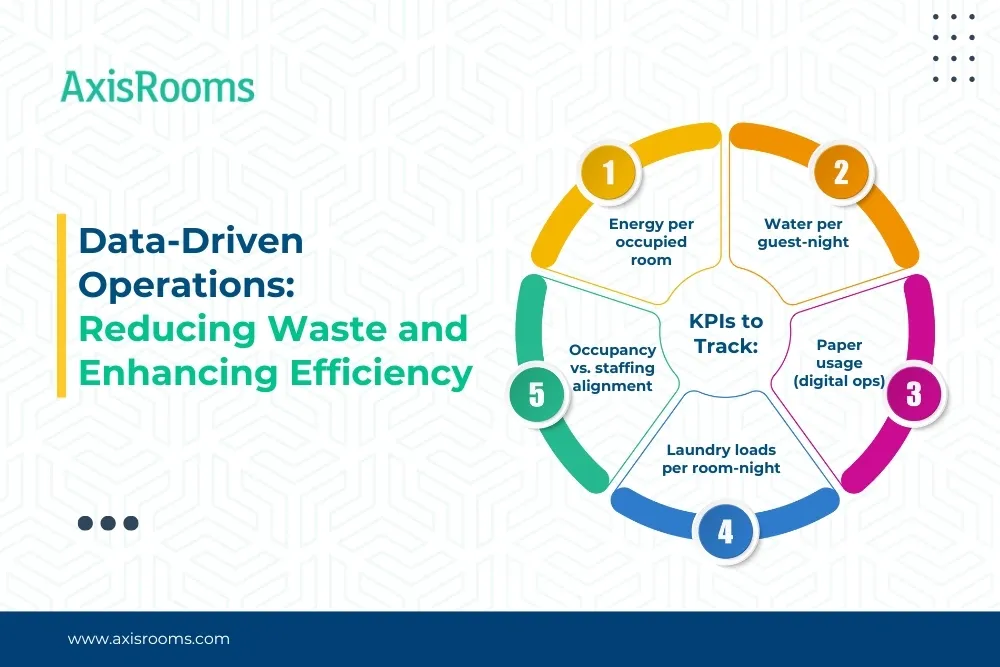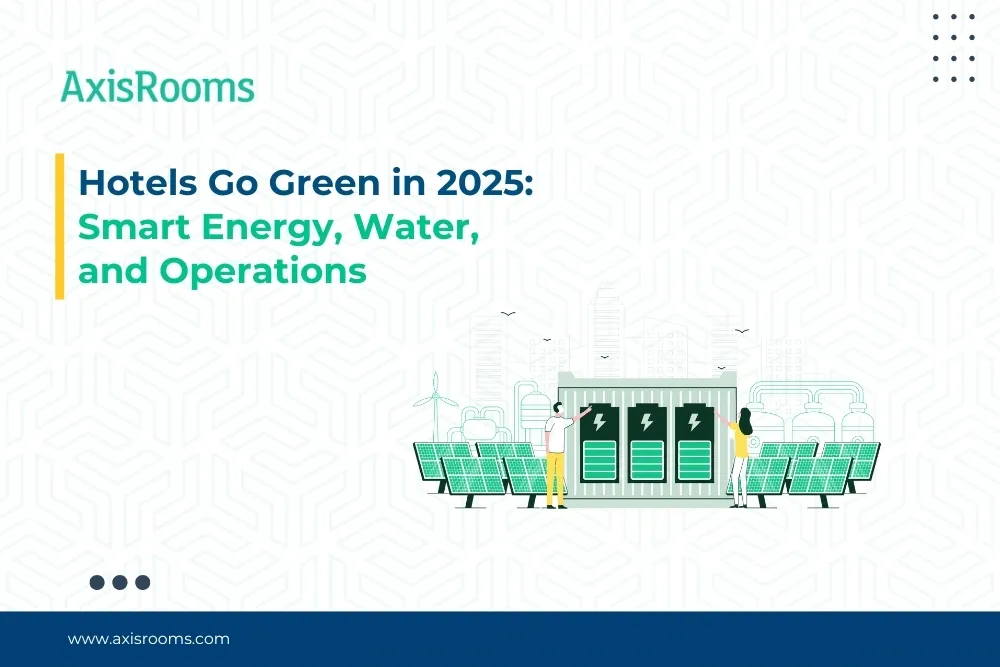The green revolution in the hospitality industry represents the strategic shift hotels are making toward eco-friendly operations using automation, hotel energy management systems, smart PMS, and hotel operations automation. This approach addresses guest expectations, sustainability mandates, and rising utility costs—all while improving operational performance.
1. Why Hotels Are Embracing Sustainability

Energy and water costs account for a significant fraction of hotel operating expenses. Energy alone can represent up to 25% of operating costs in some hotels. Water usage—especially in water-scarce destinations—can reach 1,500 liters per room per day, far exceeding residential use.
These figures underscore why hotels must shift toward technology-driven resource management to remain competitive and cost-effective.
2. PMS‑Integrated Energy Management: Proven Energy Savings
Washington Hilton Case Study
An independent test of standalone EMS (room-level motion-controlled thermostats) versus networked PMS-integrated EMS found:
- Standalone EMS: ~27% HVAC energy savings
- Networked EMS with PMS integration: up to 57% HVAC energy reduction
New Delhi Luxury Hotel (KNX System)
A New Delhi luxury property using a KNX-based automation and PMS-integrated EMS system achieved estimated energy savings of 15–20% through automated HVAC, lighting, and shading control.
Industry-Wide Projections
Wireless energy management systems in hotels can deliver 20–50% energy savings, often achieving ROI within three years.
3. Automation and Smart Systems That Drive Sustainability
Real-World Savings
Hotels using Verdigris Adaptive Automation reported 20%+ energy savings on controlled loads.
4. Water Conservation Through IoT and Monitoring
Smart water systems provide leak detection, consumption analytics, and automated alerts.
- Hotel restrooms account for 30% of total water use
- Smart fixtures can reduce water bills by up to 30%
- Hilton properties reported 43% water savings since adopting monitoring systems
5. Data-Driven Operations: Reducing Waste and Enhancing Efficiency

Smart hotel PMS and hotel data analytics tools allow hoteliers to forecast demand, control costs, and operate leaner.
6. How AxisRooms Supports the Green Tech Shift in Hotels
Key Features That Align with Green Hospitality:
- Smart Booking and Distribution: With AxisRooms’ real-time channel manager and OTA integrations, hotels can reduce overbookings, manage demand intelligently, and consolidate room usage—minimizing energy consumption in unused wings.
- Rate Intelligence and Demand Forecasting: Helps revenue teams anticipate occupancy and staff needs more accurately—reducing resource wastage and forming a core part of a data-backed hotel revenue strategy.
- Seamless PMS Integration: Syncs with smart PMS and third-party automation tools for housekeeping, F&B, and front-office functions—streamlining energy usage and operational costs.
By integrating tools like AxisRooms, hotels not only gain better control over guest demand and pricing, but also enable the kind of data-backed decision-making necessary for modern green hospitality solutions.
7. Real-World Impact: Tech-Driven Sustainability in Action
Case Study 1: Washington Hilton
Achieved 57% HVAC energy savings with PMS-integrated EMS
Case Study 2: New Delhi Luxury Hotel
Saved 15–20% total energy with KNX-based automation
Case Study 3: Iberostar Hotels, Spain
Their Respira® system delivered 25% HVAC demand reduction and 15% overall energy savings
Conclusion: Technology Powers Green Hospitality
Hotels embracing the green revolution in the hospitality industry are moving toward long-term sustainability and profitability. By using tools like:
- Smart hotel PMS and automation systems
- Hotel energy management systems
- OTA integrations and smart channel managers
- Eco-friendly hotel software
- Hotel data analytics for operational decisions
They reduce waste, optimize labor and utilities, and elevate guest satisfaction—all while contributing to global sustainability goals.
If your hotel aims to balance growth, compliance, and guest experience, the smartest move is to invest in systems that support both sustainability and operational performance.


